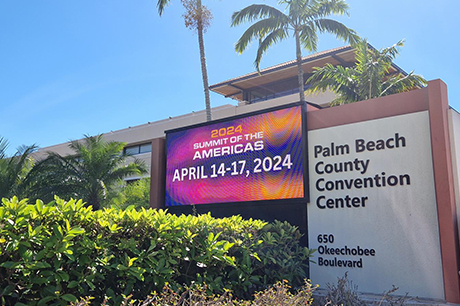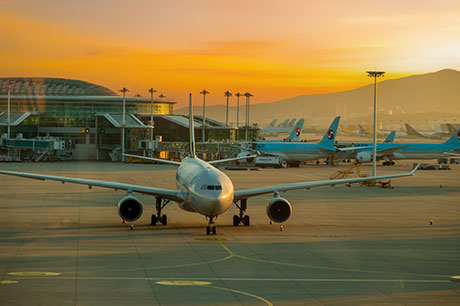GSF Düsseldorf part one: Technology, value and brand building lessons for TR
By Luke Barras-hill |

Eli Fel, Founder and Honorary Chairman, GSF sets the scene for an enthralling day of immersive presentations, deep-dive discussions and quality business networking.
Today’s digital boom owes much to those successful companies that address customer problems in an era of instant self-gratification, rather than firms attempting to painstakingly mastermind awe-inspiring solutions.
This was just one critical message handed out to travel retail during a packed day of presentations and deep-level discussions at Global Shopping Forum (GSF) 2019, held on 7 November at Düsseldorf Airport (DUS).
With Google introduced to a mass audience of travel retail and duty free professionals via a special event last year, it would be fair to say that this year’s iteration of Global Shopping Forum was going to be a tough act to follow.
On a clear day with a spectacular view of the runway, Global Shopping Forum 2019 assumed a very pertinent theme, ‘The Power of Innovation: How To Bridge The Digital Gaps In The Travel Retail Industry’.
More than 65 executives in the fields of digital marketing, communications, business development, concession management and associated disciplines from airports, retailers, brands, airlines and other ancillary providers gathered for the data-rich, one-day boutique seminar.
TWO TRILLION DOLLAR OPPORTUNITY
TRBusiness was once again selected as the official – and only – media partner to support GSF 2019, a cooperation between Düsseldorf Airport, Travel Blue and Global Blue, with m1nd-set appointed Research and Content Partner.
Presentations revealed actionable insight, disruptive solutions and emerging technologies, while the presence of Google, Lufthansa Group, Gebr. Heinemann, Dufry, Travel Blue, Düsseldorf Airport, Portland, Baidu and Ctrip, among others, provided ample networking opportunities.
An opening cocktail was held on 6 November at Lido Bistro in Düsseldorf and the event concluded on 7 November with a networking dinner.

TRBusiness was once again selected as the exclusive – and only – travel retail media partner for Global Shopping Forum.
The boutique-style conference has built a steady and loyal following of thought leaders, decision makers and digital natives over a number of years and has established itself as an incubator for novel ideas and critical thinking in the travel and shopping industry.
Eli Fel, Founder & Honorary Chairman of GSF and Managing Director, Travel Blue Germany was keen to impress on TRBusiness in the lead up to the event that GSF 2019 would challenge the clear gaps in travel retail digital provision. He duly reiterated that message to delegates in his opening statements at the conference, promising three clear takeaways.
These were: Groundbreaking content; insight and innovation centred on successful – and not so successful – business strategies, IT systems and media tools; and business networking to forge new partnerships and alliances.
Fel introduced proceedings by drawing on research to remind each attendee that the global foreign visitor spending market, including duty free, tax free and hospitality services, is tipped to exceed US$2tn by 2020. This represents an effective doubling within less than 10 years [Source: Amadeus].
In Asia Pacific alone, spending by residents is forecast to edge up to account for 50% of the total travel retail market [Source: Amadeus].
However, the aforementioned gaps at airports are – unsurprisingly – dwindling spend per pax and a travel retail digitalisation landscape ripe for disruption.
The average index spend per passenger at airports has declined by 3.1% in the five years to 2017 [Source: Albatross; BCG analysis], Fel continued.
Travellers’ purchasing behaviours are also changing unequivocally, with likes of Amazon Go redefining the conventional airport revenues ecosystem.
“We live in a bubble; we think we are being sheltered from high street competition, we don’t have the downtown pressures, we have a captive audience… but we miss coping with the challenges and changes of consumers and customers,” announced Fel.
He identified a number of themes providing the basis of the day’s discussion, including why DF&TR is under-utilised by travellers, modes to engage and enthuse passengers, and how to reinforce confidence in the value proposition.
More specifically, these were addressed via questions such as ‘how do international airports transform themselves into omnichannel digital commerce destinations?’; ‘How do legacy carriers combine on-board shopping with ground touchpoints for a seamless experience?’; ‘How do brands and retailers strengthen their customer bases and acquire new ones before and during the journey?’; ‘How does social media and big data analysis help connect with travellers in a mobile-first world?’; and ‘how do you ensure businesses exceed expectations among travellers?’
DIGITAL: THE DEATH OF BRICKS & MORTAR?
Pia Martina Klauck, Head of Commercial Operations at Düsseldorf Airport set the scene by emphasising the airport’s slogan, ‘For the people, for the region’.
Situated in the north west of Germany, Düsseldorf Airport handled 24.3 million passengers in 2018 and estimates 25.5m this year.
Serving 200 destinations in more than 50 countries, the majority of its traffic is regional. More than 10% travel from DUS more than 10 times per year.
Despite the demise of Air Berlin – the airport’s largest carrier – two years ago, Klauck points to the resilience and agility of other airlines such as Eurowings in supporting the airport for the loss of 300,000 Air Berlin pax the year after the airline’s collapse (2017).
At present, Düsseldorf Airport boasts 60 shops, four duty free outlets (all run by Dufry) and various new pop-up concepts. The airport’s shops penetration rate is around 40%.

Eurowings was among a crop of airlines that helped sustain traffic levels at Düsseldorf Airport following the demise of largest carrier Air Berlin in 2017.
“We are trying to mix up the entire retail mould with new pop-up concept solutions, working together with our media management partners to create new ideas and bring partners to the retail world,” Klauck told GSF delegates.
She then turned to explaining how the airport continues to develop the door-to-door customer journey model through the lens of multi-level touchpoints, including digital, to optimise customer pathways to purchase.
This invariably focuses on ascertaining ways to bundle the product offer across this journey.
Staying with airports, Ricardo dos Santos Miquelino, Future Society Scout, and dos Santos provided a theoretical assessment on the future commercial picture using different discourses.
And dos Santos has worked closely with Düsseldorf Airport on mapping commercial opportunities across its campus.
In a thought-provoking presentation, dos Santos Miquelino began by asking delegates to forget about technology to imagine a future 10 years from now.
“When we talk about the future, what we tend to do as humans is [..] we get surprised and engaged in all the fascinating things technology does and overestimate the impact it has. On the other side, we underestimate the big change that will happen in the future through the technology that is introduced to the market.
“What we don’t do when we see technology is ask what sort of added value we will see and [how it delivers] against motivations or needs that people have.”
The advent of the smartphone, for example, drives a propensity to make people impatient and drives motivational independence, he said.
In travel, he identified the key trend towards personalisation, simplification and ‘bleasure’ – a mix of leisure and business – where work takes on some of the features of play that extend beyond offering passengers at airports free wifi, for example.
Enhancing productivity, including stress reduction by providing travellers with access to required services such as wifi, and ensuring more flexible travel arrangements, unique experiences and fostering ‘escapism’ as an antithesis to their daily lives are also important, he continued.
The prominence of more ethical behaviour when it comes to the environment is not to be ignored, he added.
“[Travellers] will behave as they do at the moment as long as there is no cheaper or equivalent offer in the market, but when a partner enters with a more eco-friendly solution, they [travellers] tend to jump over to this solution immediately, provided it is the same price.
“Ethical awareness is very important. I do not want to call it greenwashing, but if you think of [Chicago] O’Hare Airport and what it is doing with their sustainability strategies and its bees population, this really helps put a positive light on the airport and this environment.”
He predicted that in 10 years, digital as a construct will not ‘kill’ bricks and mortar retail as we view it today. Rather, it will ‘kill’ conventionality and revolutionise the physical space.
UBER’S GAMECHANGER
“You need to think more of the needs and values that people want to see addressed and then use digital to meet those values, motivations and needs,” he told the audience. “You will then have a chance to revolutionise the physical space.”
Retail in the future, he suggested, is not just about selling, but brand building.
After outlining a series of future scenarios influencing airports and retail, he said intuitive, social spaces will emerge that provide added value for travellers, while artificial intelligence (AI) will be an enabler for breakthroughs in data science, driving revenues and customer satisfaction.
Asked by moderator Peter Mohn where the key mega trends in airport retail lie, dos Santos Miquelino noted personalisation as important.
TRBusiness then questioned whether the term ‘phygital’, a piece of diction that seems to have been absorbed almost unilaterally into the vocabulary of travel retail, was a useful definition to describe the industry’s relationship with digital at a time when it is struggling to lift penetration and spending from traditional shops.
“Good question – to a consumer, it is an element that ideally surprises and enchants them and is more than a one-time effect,” he responded.

Lewis Allen, Director of Environments, Portland Design delivered a stark reality check on brand amplification, marketing, advertising and customer engagement in retail’s physical and digital universes.
“In the beauty industry there are examples of augmented reality and makeup apps where we see people use them once and never again. Phygital needs to add value for consumers, thinking first about the traveller and then the technology that is used.
“Think about Uber. It didn’t just digitalise the cab business, they delivered tranquillity and trust in a business where there is no tranquillity and trust. They delivered against a very specific need and motivation that people have: to be successful. There are so many opportunities now with technology to meet a certain dissatisfaction that you couldn’t do in the past.”
One delegate questioned whether people are willing to pay in a sustainable manner for services like Uber, a company that is losing billions of dollars.
Another responded, stating that despite Uber losing money it has changed the mindsets of traditional companies.
Mario Kalsch, Head of Ancillary Services, Lufthansa group and Martin Neuser, Consultant, Lufthansa Group were next to address Global Shopping Forum delegates.
The airline set about presenting some revealing insights and a new concept for airport shopping, although for reasons of privacy TRBusiness is unable to reveal further detail on this.
Following, Michael Mauerhoff, Head of Marketing Sales DACH, Global Blue Deutschland, presented several successful marketing solutions used to attract Chinese travellers.
He began by stating that within Germany, the tax free market enjoyed 16 million non-EU arrivals last year, 40% of which were Chinese.
Referencing the potential to optimise WeChat for tax free sales – the company possessed more than one billion users in 2018, 50% of which were tourists and the overwhelming majority (98%) being those aged 25-40 years of age – Mauerhoff outlined a successful campaign at Zurich Airport (ZRH)
GLOBAL BLUE ‘SHAKES UP’ ZRH
A similar campaign also ran at Frankfurt Airport and there are plans to execute something for China’s peak travel period Golden Week in 2020.
At Zurich Airport, Global Blue generated impressive results in engaging and converting travellers in line with Golden Week this year.
Prominent offline messaging at the airport was used to attract travellers’ attentions at key dwell areas such waiting zones in the shopping districts.
Ibeacons and WEChat-enabled QR codes displayed on advertising hoardings were implemented to capture engagement.
Chinese travellers were then offered the opportunity to download a coupon via their WeChat Wallet to relinquish for goods instore.
This was achieved using the WeChat Shake concept to allow passengers to convert a coupon into a voucher to redeem in stores.
The campaign generated 950-plus shakes with WeChat, more than 1,500 scans, 2,000 coupon downloads and a 10% rise in sales in store.
It targeted 42,000 departing travellers to Asia, with 2,450 campaign interactions and a +5.8% interaction rate.
Concluding, Mauerhoff identified that airports have the potential to undertake more Google targeting to harness Chinese travellers and work more closely with digital natives for specific passengers such as Chinese.
He crystallised his presentation into three key takeaways: Understanding your audience and their expectations; building on existing technology; and committing to extra-mile customer service.

Peter Mohn (right), CEO, m1nd-set co-moderated Global Shopping Forum 2019. The firm also supported the event as Research & Content Partner and presented data during the day.
In one of the standout presentations of the day, Lewis Allen, Director of Environments, Portland Design took delegates on an eye-opening journey through the evolutionary and unrelenting retail industry, its winners and losers.
Allen, in a presentation dubbed ‘The Revolution Will Be Digitalised’, began by acknowledging that there are lessons to be learned from the fairly uncompromising revolution that has taken place in domestic retail.
With that in mind, travel retail has an opportunity to plug some of the gaps via digital to soften any potential revolution that takes place, he indicated.
He was clear on the importance of ensuring a balanced, adaptable and flexible space to enable commercial environments to flourish.
ALLOWING RETAIL TO BREATHE
“We need to reflect in the physical space this ability to refresh in a much higher degree of frequency,” he said, using the example of the Global Bazaar food hall at Newark Liberty International Airport that utilises a combination of analogue and digital signage to refresh the F&B menus to suit the time of day.
“Our physical spaces need to echo that expectation that we are offering them things that change and we need to be able to change the offers, concepts, signage, language and so on.”
Having a well-mapped out service infrastructure from marketing to epos systems to accommodate local and international brands is important, he continued.
The ability of retailers to be responsive in their fulfilment was also flagged, with Allen mentioning he is tired of hearing the excuse that shops do not stock items in a certain size or colour.
He illustrated a Westfield outlet in the UK housing Zara that converted car parking space into a robotic stock room for items to be pre-ordered.
“If you want to offer convenience to customers they need to be adjacent to the brands where people are shopping and picking products.

More than 65 executives in the fields of digital marketing, communications, business development, concession management and associated disciplines from airports, retailers, brands, airlines and other ancillary providers gathered for the data-rich, one-day boutique seminar held at Düsseldorf Airport.
“There is the idea that media spend, advertising spend and marketing spend wants to find a more effective space where it reaches customers in a better way. Airports have a fantastic captive audience and are very attractive to a brand whose media and advertising budget is going nowhere.”
Allen said there is also a revolution occurring in the parallel or augmented reality space; the Pokemon Go phenomenon of people interacting in a virtual way being just one example.
CONSIDERING ‘HALO REVENUES’
Squaring this example with travel retail, Allen stressed the importance of amplifying the space of commercial environments to an active – not necessarily captive – audience; those who are actively discussing and sharing what businesses such as airports are doing.
“People want brands to understand them and feel they share their values, principles and aspirations and that gives them a sense of belonging,” in doing so referencing the bold and controversial advertisement campaign by Nike, made famous by American football player Colin Kaepernick.
Kaepernick had previously knelt during the national anthem to protest police brutality against African Americans in the US.
His appearance in the advert, which prompted a backlash from US President Donald Trump, used the strapline: ‘Believe in something. Even if it means sacrificing everything’.
The impact was momentous, elevating Nike’s sales and consumer recognition to new heights.
“We in travel retail need to connect to those different purposes people have and one way to that is to be a very good listener,” said Allen. “There is a massive conversation happening out there in social media and it is important to understand what they are talking about, and what they want to buy.”
Recruiting the correct partners based on their digital interactions remains a constant for success, Allen suggested, as the conversion between online and offline ecosystems becomes more pronounced.
The decline in rent and turnover at airports linked to productivity, transactions and measuring space is one feasible explanation, however, the model’s decline can also be viewed in the constraints on space, experimentation and flexibility, he suggested.
“All the things the consumer wants from the digital life… we create contracts, spaces, systems that constrain every brand’s ability to deliver newness and digitalised experiences they expect,” he stated. “The current model is not fit for purpose as we see stores as media platforms. Future space productivity needs to be measured in different ways.
“We work all the time with tenders that are offering contracts under terms that are not friendly or favourable to these new types of experience. Do we want to write tenders for a retail platform that are ten or 15 years out of date?
“We need to put a value on impressions, customer acquisition and value on things we are delivering in our channel and frankly are not getting value for at the moment.”
He concluded by touching on the importance of so-called ‘halo revenues’: indirect value generators that incite customers to purchase later.
Click here to read GSF Düsseldorf part two: Wholesale & retail in focus
All images (with the exception of Düsseldorf Duty Free) courtesy of Global Shopping Forum.
Alcohol insights: Conversion up, spend down in Q4
Conversion of visitors in the alcohol category in duty free has risen to 54% in Q4 2023,...
Saudia Arabia's KKIA unfurls T3 duty free expansion
King Khalid International Airport (KKIA) has unveiled the first stage of its much-vaunted duty...
TR Consumer Forum: Agenda & speakers revealed
Influential speakers will unpack the most effective strategies for understanding and engaging...
-
 International,
International,Alcohol insights: Conversion up, spend down in Q4
-
 International,
International,Saudia Arabia's KKIA unfurls T3 duty free expansion
-
 International,
International,TR Consumer Forum: Agenda & speakers revealed

In the Magazine
TRBusiness Magazine is free to access. Read the latest issue now.

 Trbusiness. The travel retail Trbusiness. The magazine for global retail and duty free professionals.
Trbusiness. The travel retail Trbusiness. The magazine for global retail and duty free professionals.



























